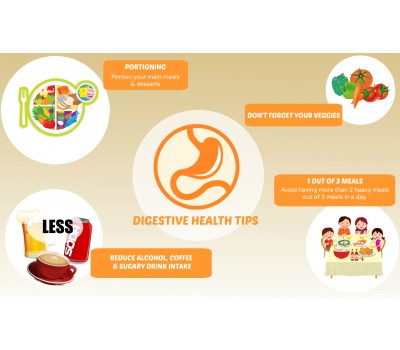Tips to Maintain Optimal Digestive Health

We have come to the most favorite time of the year again! Who doesn’t love a heartwarming family reunion meal prepared by the elders and savoring all the Chinese New Year goodies like Bak Kwah (Chinese Bacon), Love Letters (Biscuit Roll), Lo Hei (Raw Fish Salad) and Nian Gao (Glutinous Rice Cake). But what comes after will be a bummer.
These high-fat, high-salt and high-sugar foods may result in you having bloating, constipation and even abdominal pain due to inadequate digestion. Eating large amount of food at one go or having inadequate chewing may lead to insufficient production of enzymes and hence, incomplete breakdown of the food.
It is also widely recognized that the billions of live bacteria, fungi and virus, known as microflora, play a significant role in our gut health. However, consuming too much sugars and processed foods would sabotage the gut microbiota kingdom as these foods act as ‘fertilizer’ for the pathogenic microorganisms, causing them to multiply.
Here are some tips on how to pace yourself with the New Year’s hype:
- Don’t forget your veggies: Even if you can’t forgo that juicy pork belly with the soft, pillowy steamed bun, get some fresh salad or cooked vegetables as your starter before tucking in. Dietary fiber will make you feel full sooner and eat less of the fatty mains.
- 1 out of 3 meals: If you know that you will be having a steamboat dinner at your aunt’s place tonight, then have it light for breakfast and lunch. It takes about 6 to 8 hours for your meal to reach the small intestine from the stomach for absorption, having more than one large meal in just a few hours apart will most likely lead to congestion.
- Portioning: We are not advocating healthy eating for a festive season, come on! But feasting on the mains and constantly snacking on the pineapple tarts and chips in between meals will definitely cause some abdominal discomfort. A muscle called esophageal sphincter prevents stomach content from flowing upwards. Having fatty, spicy or acidic foods and drinking alcohol or caffeine can cause relaxation of the sphincter, resulting in up flow of the digestive juices causing heartburn. Hence, be mindful of your main meal and desserts by portioning them.
- Your beverage choice: Coffee, tea and other sugary drinks will not only increase your blood sugar, but also requires more water to flush out these fluids from your body as they contain unnatural ingredients. Thus, drink water instead as it is essential for removing toxins and waste from the body and transport nutrients around the body. Without water, the colon can dry out leading to constipation and the kidney would not be able to remove waste products from the blood efficiently. Another detoxifying tonic would be Green Tea that helps to flush toxins out of the system and aid in digestion.
If you are not feeling any better or just choose to go all out on the New Year’s feast, Life Extension Enhanced Super Digestive Enzymes with Probiotics have you covered. This supplement contains all the essential enzymes required to break down carbohydrates, protein and fats, optimizing digestion and nutrient absorption so that it prevents you from feeling bloated after eating a large meal. This product also contains probiotic B. coagulans which have shown to support digestive health and suppress less beneficial bacteria.
Another remarkable aid is from CarnoSoothe with PicroProtect™ that contains nutrient compounds that modulate the growth of H. pylori while supporting the health of the gastric lining. H. pylori are bacteria that grow in the digestive tract and attack the stomach lining causing ulcers. The novel compound Zinc-carnosine added in CarnoSoothe has shown to inhibit stomach inflammatory factors and the effects of cytokine release associated with H. pylori.
Some vegetarian options would be New Chapter Ginger Force® and Physician’s Series Probiotics that will provide our body with beneficial bacteria to promote intestinal health and immune function. The latter has also been shown to suppress inflammation, modulate signaling pathways and influence youthful gene expressions.


Social Login